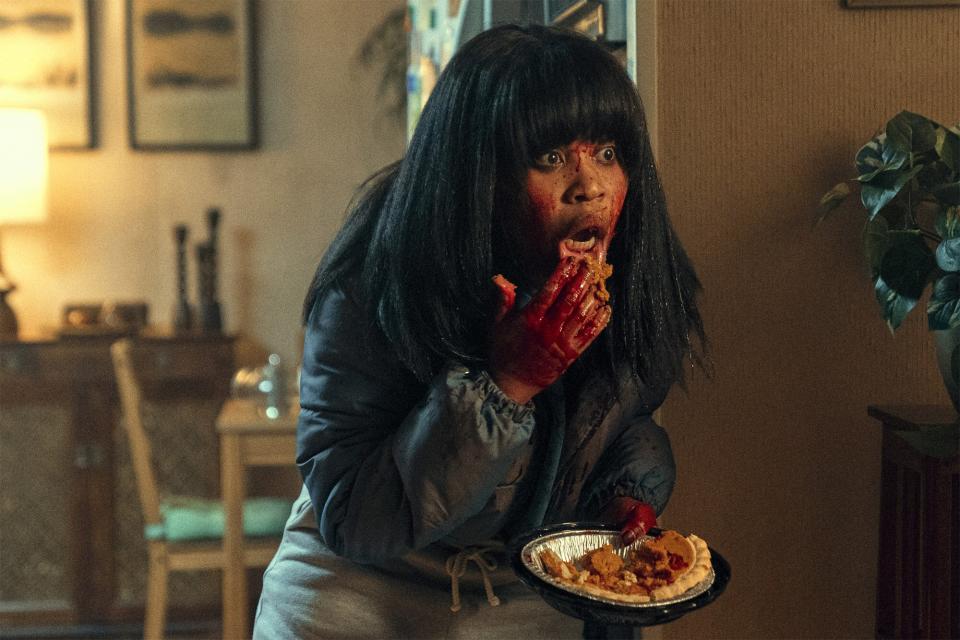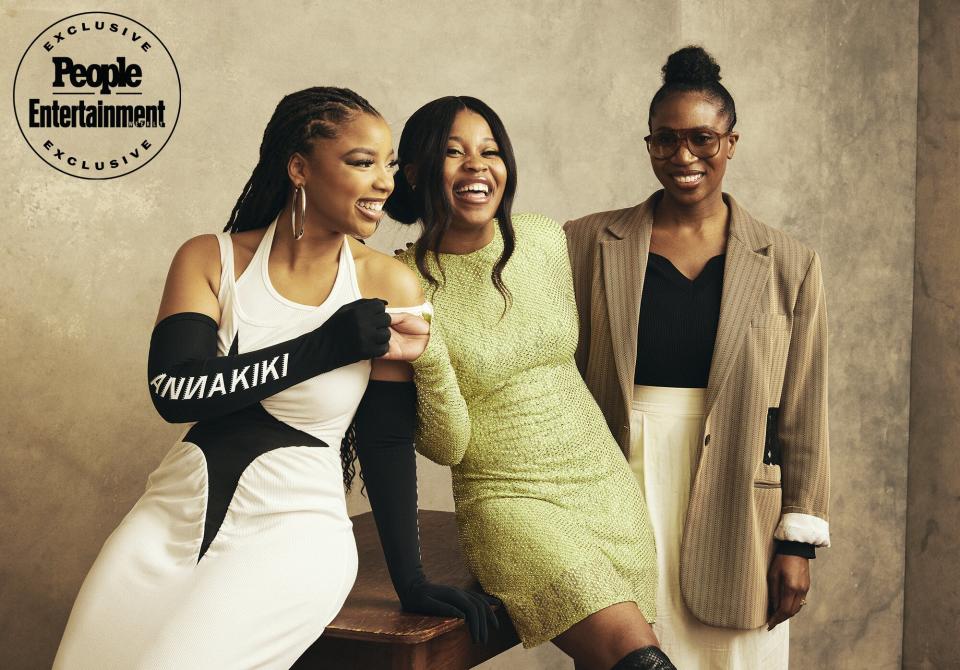Swarm co-creator on the 'uphill battle' for Black creators to tell stories that aren't 'happy'
Swarm has set the internet buzzing and the Hive has had some thoughts. The series is a wild, careening mix of thriller, satire, and psychological drama, with bits of horror and slapstick comedy thrown in for good measure.
But it's not just it's deft genre bending and blending that sets it apart from the rest of the television landscape. There's the fact that the protagonist is a Black woman who gets to do what white men have been doing for the last two and a half decades, since Tony Soprano woke up one morning and got himself a gun to do objectively bad things, that is, and still elicit a sort of moral gymnastics from audiences to cheer, and even sympathize with her at times.
For co-creator Janine Nabers, Swarm was all about "creative freedom," a grand, audacious experiment that could've blown up in the faces of everyone involved. Instead, it's been like a shot of adrenaline into the zeitgeist, a show so crazy, and good, and of-the-moment that one hopes for more experimentation when so much of TV (and there's so much TV!) feels like paint by numbers.
"I just really hope that this show inspires other Black women to write outside the box of Black female characters," Nabers tells EW. "It's a very risky show for Amazon. And the fact that they backed a mostly Black female creative team to write and produce and direct this series is really incredible."

Tyren Redd 'Swarm' co-creator Janine Nabers
Nabers was a writer and producer on Atlanta, the brainchild of Donald Glover, with whom she created Swarm. Dominique Fishback delivers a stunning performance as Andrea "Dre" Green, a grief-stricken young woman who cuts a murderous swathe across the American southeast between 2016 and 2018. The ostensible reason for her homicidal mania is her love of a Beyoncé-like pop goddess, Ni'Jah.
What greater idols exist in modern culture than the international pop star? They occupy a rarified space in people's imagination and their music is more intimate and personal than, say, a film or TV show. Pop stars can live in your head, in your ears, in your heart. Ni'Jah represents something ephemeral to Dre; the connection she had with her sister and fellow Ni'Jah stan Marissa (Chlöe Bailey), for whose death she feels somewhat responsible. So killing people who diminish Ni'Jah is both an act of retribution and absolution.
"I think [Dre] is an anti-hero from her own perspective. I think she stands for something very important to her. And that is really, I think, what an anti-hero is," Nabers says. "I think if you can find some sort of connection or empathy for them, then great. I think that that's awesome."
"But when I look at anti-hero characters that I've loved as a writer, you don't always agree with the choices that they're making, but you can at least understand the fundamental want and need that they have. And I think everyone seems to understand that this is a woman who loves her sister and loves this artist and will do anything for the two of them."

Warrick Page/Prime Video Dominique Fishback in 'Swarm'
When asked if there are different rules for Black anti-heroes as opposed to white anti-heroes, Nabers considers them "one and the same."
"I feel like we have to stop looking at them as if they're different because they're different races," she notes. "I think that's a muscle that we have to develop as Black people in the world who want to stand equally next to white people and the weird stories that they're allowed to tell. I think it's really about that. And I feel like it should be equal across the board in definition for both Black and white people."
As American television has been clawing deeper and deeper down its rabbit hole of serial killer obsession, it's led some to worry that these shows humanize, romanticize, or otherwise glorify the act of murder and those who commit it. But the reason creators love to make these shows, and why audiences watch them, is that people do connect with these characters on some level. Swarm allows a mining of these dark, unspeakable corners of humanity, in which you can see yourself — then separate yourself.
"The only reason you want Andrea's sob story is so you can absolve yourselves," case worker Roberta Kirby (played by Bonita Elery) admonishes a camera man who's too eager to uncover what she might be "hiding" about Dre in Swarm's mindf--- of a sixth episode. Kirby continues, "You need there to be a reason she was so messed-up so you don't have to sweep your own front door and realize that you are just as flawed."
That episode, "Fallin' Through the Cracks," flips the entire show on its ear by taking on a documentary style, which Atlanta utilized to great effect (see, immediately, the final season's eighth episode, "The Goof Who Sat by the Door.")
"I love documentaries. Donald loves documentaries," Nabers says. "I think we really wanted to show an episode of Dre without her in it from the perspective of another Black woman, and kind of layer it in the idea of researching her background without it being trauma porn, where it's a little bit more intellectualized. I think that was really the overall goal for that episode. It's a little cheeky, but that's the intention."

Robby Klein/Contour/Getty Chloe Bailey, Dominique Fishback, and Janine Nabers of 'Swarm'
Swarm has proven buzzy fare, provoking social discourse and disagreement, much like the 32-time Grammy winning diva-spring from whence it draws influence. Nabers is, wisely, not on social media, so she's not entirely sure what people are saying (though she says her friends will gladly text her things unsolicited) but she just hopes that the conversations being had are positive and that the show is not construed as "ripping other women or Black people apart from a Black woman's perspective."
Still, for a show to cut through the cacophony of content when every mega-conglomerate has a streaming service (Swarm is on Prime Video), it's simply got to push some hot buttons.
"You want discourse because you don't want silence," Nabers says. "You want a show that makes noise, and it's okay if it's good or bad. I think white people have been given this space literally for years, and I'm still fighting the uphill battle of white executives saying, 'We want black people to be happy.' Those are notes that people give."
She adds, "And that's the reality that I think exists with Black people on TV. And I kind of want to be like, f--- that. Let's just show what we want to show. Let's mix it up a bit."
Sign up for Entertainment Weekly's free daily newsletterto get breaking TV news, exclusive first looks, recaps, reviews, interviews with your favorite stars, and more.
Related content:

 Yahoo Movies
Yahoo Movies 